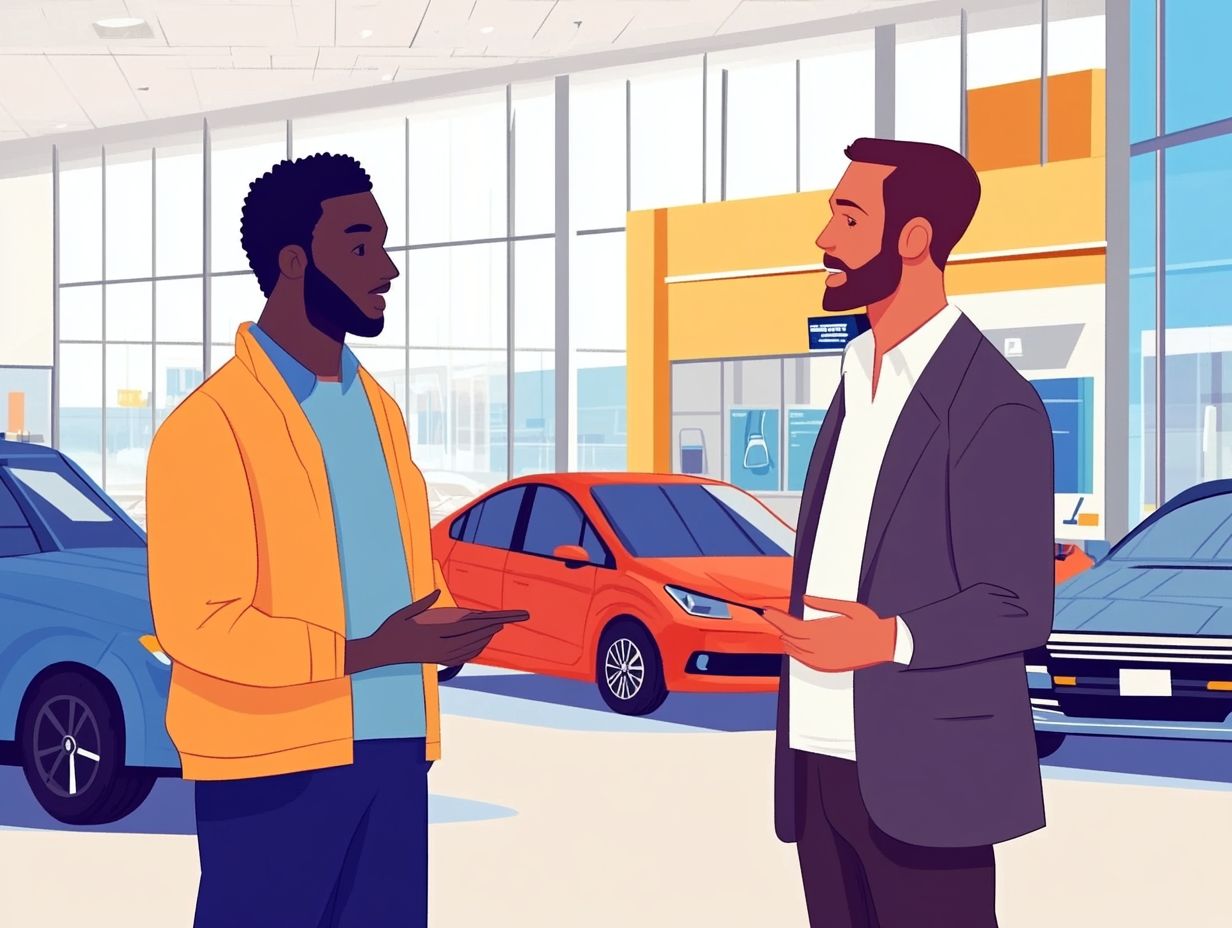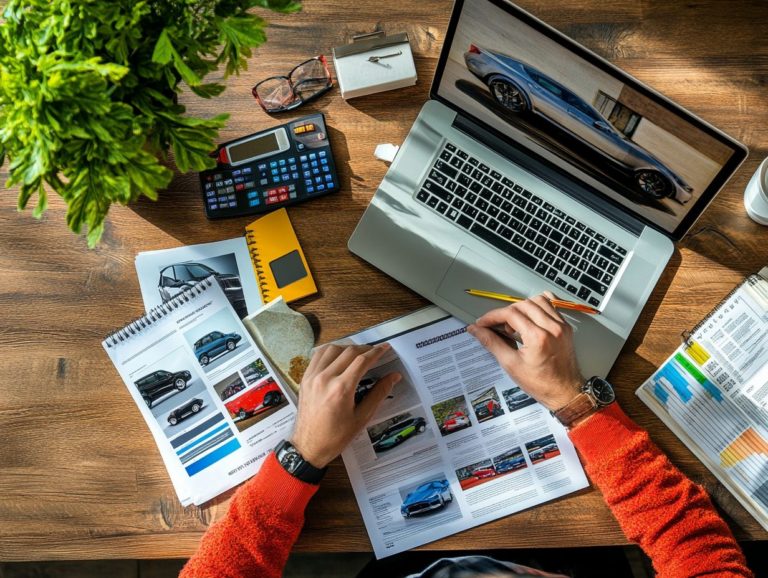Best Negotiation Strategies for Used Cars
Navigating the used car market is an adventure filled with excitement and challenges. With many options and varying prices, understanding the factors that affect costs is essential for making informed decisions.
Discover effective strategies to negotiate a fantastic deal. Research both the car and the seller, establish a clear budget, and set your priorities. You will learn essential negotiation techniques, how to seal the deal, and tips for a seamless transaction.
Get ready to drive away confidently in your dream car!
Contents
- Key Takeaways:
- Understanding the Used Car Market
- Preparing for Negotiation
- Negotiation Techniques
- Closing the Deal
- Post-Negotiation Tips
- Frequently Asked Questions
- Want to know how to negotiate better for your used car?
- Is it better to negotiate in person or online when buying a used car?
- How can I use timing as a negotiation strategy for buying a used car?
- What should I do if the seller is not willing to negotiate on the price of a used car?
- Are there any negotiation strategies I should avoid when buying a used car?
- Can I negotiate the price of a used car at a dealership?
Key Takeaways:
- Research the market and seller to find a fair price.
- Set a clear budget and stick to it!
- Start negotiations with a lower offer.
- Be ready to walk away to get the best deal.
- Finalize all details and prepare for any issues post-sale.

Understanding the Used Car Market
Understanding the used car market is vital for buyers looking to navigate their options with confidence, especially in January 2024.
Many factors influence pricing, from vehicle history to average price trends. Insights from trusted sources like Edmunds and Kelley Blue Book can also help.
Evaluate trade-in values and learn how prices can fluctuate, especially after events like the COVID pandemic. Being informed empowers you to make savvy decisions in this dynamic landscape.
What Affects Used Car Prices?
Many factors affect used car prices, including the vehicle’s condition, market demand, and the importance of vehicle inspections and maintenance records.
The age of the vehicle is crucial; newer models typically hold their value better than older ones. Mileage also plays a vital role: cars with lower mileage often fetch higher prices due to their perceived reliability and longevity.
Establish a maximum budget based on competitive pricing in your local market to avoid overspending. Conduct thorough vehicle inspections to uncover potential issues that might impact overall value, ensuring you make well-informed decisions.
Exploring financing options provides added flexibility, allowing you to find a deal tailored to your financial situation.
Preparing for Negotiation
Get ready to negotiate! It’s your chance to save big on your used car. Mastering the art of negotiating car prices can lead to substantial savings, whether you’re dealing with a private seller or a dealership.
Conduct thorough research online, utilize buyer guides, and gather insights from the vehicle’s inspection report. This preparation positions you to negotiate in person with confidence.
Researching the Car and Seller
Researching both the car and the seller is crucial for a successful negotiation when purchasing a used vehicle. Tools like Carfax and AutoCheck provide valuable insights into the vehicle’s history.
A meticulous examination of inspection records is vital. This allows you to uncover any past accidents, repairs, or odometer discrepancies that might affect the vehicle’s current condition.
Delving into reputable pricing guides equips you with the knowledge necessary to assess fair market value, reinforcing your position during negotiations. This thorough approach helps you avoid pitfalls associated with unscrupulous sellers, elevating your overall car-buying experience. You will feel confident and well-informed throughout your decision-making journey.
Now that you’re equipped with this knowledge, go find your dream car with confidence!
Setting a Budget and Priorities

Setting a budget is key to your used car journey. It helps you decide your maximum price and explore payment options.
Consider future costs like maintenance and warranties. These can really impact your total expenses.
When crafting a budget, research average repair costs for different makes and models. Also, evaluate warranty packages that give you peace of mind against unexpected repairs.
Understanding how interest rates and loan terms affect your monthly payments is crucial for knowing what fits comfortably within your budget.
Don t forget to set aside funds for insurance and registration. This gives you a realistic view of your total vehicle costs.
Negotiation Techniques
Winning at negotiation can make all the difference in your car-buying adventure! With the right strategies, like learning how to negotiate with car dealerships, you’ll feel confident and ready.
Effective Tactics for Getting a Better Deal
Use smart tactics to get a great deal. Compare prices wisely and make your offers count!
These strategies empower you as a buyer, giving you invaluable leverage. For example, presenting a lower initial offer can shift the dynamics in your favor.
Being prepared to walk away often encourages sellers to offer better terms, as they realize the potential risk of losing a sale.
Utilizing pricing comparisons from reputable platforms can illuminate market trends, helping to substantiate your position and leading to a favorable outcome.
Closing the Deal
Closing the deal means finalizing the price and terms. Take your time and consider warranty options carefully.
Ensure that all inspection reports align with your purchase decision, informed by diligent research and comprehensive buyer guides.
Finalizing the Price and Terms
Finalizing the price and terms requires careful attention to all factors discussed during the negotiation process. Aim for competitive pricing and ensure transparency.
Review every detail meticulously to avoid misunderstandings later. Make sure that all agreements are clearly documented and fully understood to safeguard your interests.
Verifying the terms helps you avoid unwelcome surprises, like hidden fees or warranty limitations. Comparing the finalized price with market values assures you that the deal is fair.
By asking insightful questions and conducting thorough research, you ll gain confidence that the price reflects the vehicle’s worth, enhancing your entire buying experience.
Post-Negotiation Tips

After negotiating, follow these handy tips to ensure everything runs smoothly. They ll help you avoid buyer s remorse and understand every part of your deal.
Ensuring a Smooth Transaction
To ensure a smooth transaction, confirm your financing details. This could mean securing pre-qualified loans or exploring various car financing options. It’s also crucial to maintain open communication with a trustworthy seller throughout the process.
Start by exploring multiple lenders and understanding their financing terms. These terms can significantly influence the overall cost of your vehicle. Once you have your financing options locked in, keep an open line of communication with the seller. This builds trust and paves the way for smoother negotiations.
Preparation is essential when navigating the final paperwork involved in the sale. Familiarizing yourself with the sales contract, changing the ownership of the car, and registration details will help prevent potential misunderstandings.
By diligently following these steps, you can enhance your chances of having a positive purchasing experience in the automotive world.
Dealing with Potential Issues
Navigating potential issues after purchasing a used car such as discrepancies in the inspection report or warranty options requires proactive communication and sharp problem-solving skills.
If you encounter unexpected mechanical problems or discover that the vehicle doesn t match the seller’s description, document your concerns right away.
Engaging with the seller or your financing institution can often lead to satisfactory resolutions, especially if warranties cover these discrepancies. Fostering open dialogue builds trust and encourages sellers to consider reasonable adjustments, like repairs, compensation, or even partial refunds.
By understanding your consumer rights, you empower yourself to navigate disputes more effectively, ensuring you receive the value and quality you expected from your vehicle purchase.
Frequently Asked Questions
Want to know how to negotiate better for your used car?
1. Do your research beforehand to determine the average market value of the car you’re interested in. This will give you a solid starting point for negotiations. 2. Start by negotiating on the car’s price rather than monthly payments or financing options. 3. Utilize your knowledge of the car’s history, such as any previous accidents or repairs, to negotiate a lower price. 4. Use any existing flaws or imperfections as leverage to negotiate a better deal. 5. Consider offering to pay in cash or making a larger down payment to negotiate a better price. 6. For more strategies, check out these negotiation tips for used car buyers. 7. Be willing to walk away if the seller isn’t comfortable with your price.
Is it better to negotiate in person or online when buying a used car?

It’s generally better to negotiate in person when buying a used car. This allows you to see and test drive the car, as well as assess the seller’s body language and tone. However, negotiating online can also be effective if you can’t meet with the seller physically.
How can I use timing as a negotiation strategy for buying a used car?
Timing can be a powerful tool in negotiations for a used car. For example, towards the end of the month, dealerships may be more willing to negotiate to meet their sales quota. Additionally, utilizing negotiation tips for luxury car buyers can help you secure a lower price during slower seasons when dealerships are trying to clear out inventory.
What should I do if the seller is not willing to negotiate on the price of a used car?
If a seller is not willing to negotiate on the price, try negotiating on other factors, such as including additional features or services like a warranty or maintenance plan. For more helpful tips, check out best practices for car negotiation. If the seller still won’t budge, it may be best to walk away and look for another car.
Are there any negotiation strategies I should avoid when buying a used car?
Avoid making a lowball offer or being overly aggressive in your negotiations. This can turn the seller off and ruin any chance of reaching a mutually beneficial agreement. Additionally, try not to get emotionally attached to a specific car, as this can hinder your ability to negotiate effectively. Instead, focus on developing essential negotiation skills for car buyers to enhance your chances of success.
Start your car-buying journey today with these tips!
Can I negotiate the price of a used car at a dealership?
You can negotiate the price of a used car at a dealership. Dealerships are generally more open to price negotiations than private sellers, especially when you apply key negotiation principles for car buyers.
Dealerships might have less room to move on prices because of their operating costs. Remember to do your research and come prepared with negotiation strategies!






